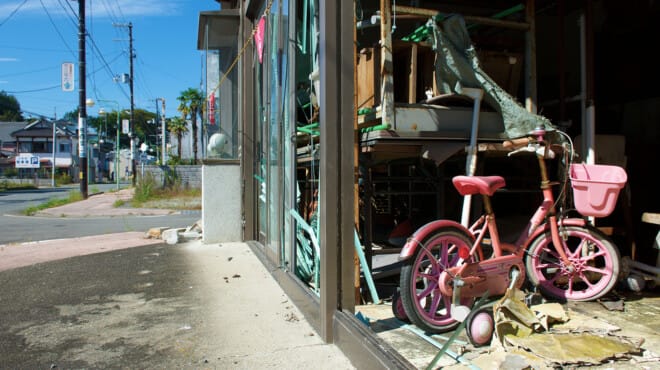20 millisieverts per year
2nd March 2017 · 12:00am - 11:59pm
In person | Virtual event

20 millisverts per year
An exhibition about Fukushima by Lis Fields
2 March – 30 April 2017
Film screening, The Brockway Room, Mon 24 April. Drinks served from 6pm, screening from 7pm – 9pm. All welcome
Little Voices from Fukushima documentary by Hitomi Kamanaka
119 min, Japanese with English subtitles
To coincide with the “20 millisieverts per year” exhibition about Fukushima, in the week of the 31st anniversary of the Chernobyl nuclear disaster (26.4.1986):
“Little Voices from Fukushima is a documentary film dedicated to Japanese mothers and children living in the post-meltdown world of the Fukushima Daiichi nuclear power plant disaster. In the course of telling their stories, Director Hitomi Kamanaka takes us to Belarus, where we learn from mothers who experienced the Chernobyl nuclear disaster 28 years ago.”
Film director Hitomi Kamanaka’s website: http://kamanaka.com/canon/english/
The Exhibition
In October 2016 Lis participated in a study tour of Fukushima, organised by Green Cross Switzerland, the international environmental NGO founded by Mikhail Gorbachev. ’20 millisieverts per year’ is an exhibition of her photographs and texts.
In March 2011 an earthquake and tsunami triggered a nuclear disaster at the Fukushima Daiichi nuclear power plant in Japan. This resulted in radioactive fallout contaminating at least 8% of the land surface of Japan and the evacuation of 164,865 people.
After six years the multifaceted catastrophe continues, despite extensive remediation efforts and spiralling costs. As well as the unresolved crises at the Daiichi nuclear plant itself, urban and rural areas remain highly contaminated and severe physical, psychological, social, and economic consequences continue to unfold for many people.
The ‘20 millisieverts per year’ exhibition title refers to the maximum dose of ionising radiation originating from a nuclear power plant to which citizens of Fukushima can now be exposed in a year.
In the rest of Japan and the rest of the world the maximum permitted non-occupational dose to a citizen is 1 millisievert per year, as recommended by the International Commission on Radiological Protection (ICRP).
This raising of the annual threshold to 20 millisieverts per year puts enormous pressure on many of those who evacuated, compulsorily as well as ‘voluntarily’, to return to live in areas which are still contaminated, as the financial support for them to live elsewhere will be terminated in March 2017.
Some of those who were compulsorily evacuated are relieved return to their former homes, despite the concerns they may have about the increased risk to their health from living in areas with such high levels of contamination. But others are outraged by the loss of financial support. They do not want to accept the increased risk to their health, and the even greater risk to the health of their children, who are much more sensitive to the effects of ionising radiation. Moreover, many evacuees have put down roots in their new communities, their children have settled into school and made new friends: six years is a long time, particularly for a child.
Many people feel betrayed by the government as well as by those in the media and scientific and medical communities who downplay the risks and support the policy of raising the radiation exposure threshold to 20 millisieverts per year. Many people, in Japan and elsewhere, consider this to be a serious breach of human rights.
The exhibition texts include statements by some of these people, who Lis met while on the tour, which reveal some of ways they are responding to the catastrophe.
For more information please visit: www.lisfields.org
Gallery opening hours
The exhibition in the corridor is available to view at any time. The exhibition in The Brockway Room is restricted to the following times;
Thu 20 April, 9am – 5pm
Fri 21 April, 9am – 5pm
Sat 22 April, 5pm-9pm
Sun 23 April, 9am-11am & 4.30pm-8pm
Tue 25 April, 1pm-6pm
Wed 26 April, 5pm-6pm
Thu 27 April, 4pm-7.30pm
Fri 28 April, 9am-10pm